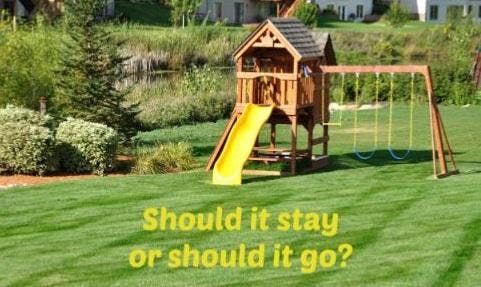Real estate professionals use the term “unless otherwise agreed” fairly regularly to cover their, um, bases. It’s a legal phrase that essentially means part of the purchase and sale agreement will move along as normal … unless a party states in writing that it isn’t so.
Information in the home listing or in the buyer-seller contract will sometimes include a change to the routine. For example, a seller may be dead set on taking a particular item in the home or on the grounds that conventional transactions require seller to leave behind.
Here are some examples of items that typically stay with the property:
Plants and shrubbery – Don’t plan on digging up anything planted in the ground and taking them with you. Conventional real estate transactions require the seller to leave everything – from trees to those favorite rose bushes – behind…unless otherwise agreed.
Fixate on fixed – Buyers and sellers often have misunderstandings about items that are on the land. Rule of thumb: If it’s fixed to the ground – a swing set, gazebo, decking, or built-in grill – it must stay….unless otherwise agreed.
Lighting fixtures – Unless otherwise agreed…expensive or favorite lighting, such as chandeliers, that a seller wishes to take should be removed from the ceiling in advance of listing the home. Most sellers visit their local DIY store, buy a new (less expensive) lighting fixture and install it before buyers show up to the open house.
Casting shade – Many window treatments are custom made to fit particular sizes in your home’s windows and doors. They may have been expensive but do you think they’ll fit in the new home? Probably not. Unless otherwise agreed…keep the blinds and shades in the existing home for the next owner to enjoy.
Excluded items often become sticking points in buyer-seller negotiations. It’s best to remove those items from the property before listing the home. (Or a seller’s agent may tag such items to avoid confusion.)
——————————————————
Did You Know?
While things attached to the earth by roots are part of the property, there is one notable exclusion. A special rule called “doctrine of emblements” applies to crops planted by a tenant farmer. If the tenancy is for an indefinite period and the tenancy is terminated through no fault of the tenant before the crops are ready for harvest, the tenant has the right to re-enter the land and harvest the first crop that matures after the tenancy is terminated. This applies to annual planting, not a vineyard or tree crops.
——————————————————
As the homeowner, you can sell personal property to the buyer. Items such as a sofa or patio furniture should be listed with their costs to buyers in a separate document called a “bill of sale” and attached to the final purchase and sale agreement.
If sellers take something not negotiated, they can possibly jeopardize the entire transaction or face a lawsuit. Best advice: Put everything in writing at the start of the process to avoid any misunderstanding.




